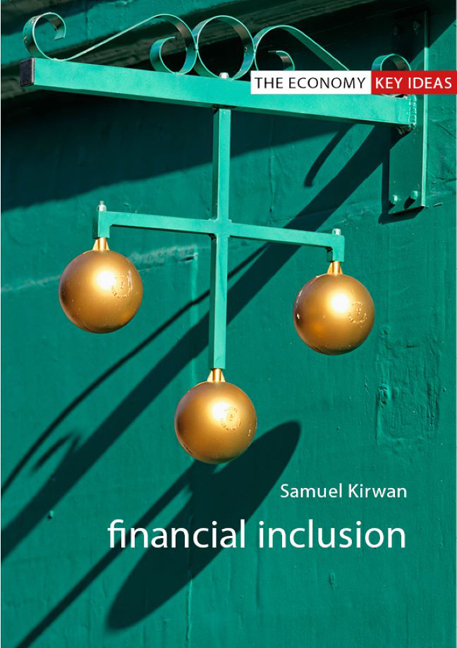Book contents
- Frontmatter
- Contents
- 1 Introduction
- 2 What is financial inclusion?
- 3 Financial inclusion as a tool of poverty eradication: the case of microcredit
- 4 Financial inclusion as the production of new markets: the case of reverse redlining
- 5 Financial inclusion as financial subjectivity: the case of financial capability in the UK
- 6 Financial inclusion as political project: the case of conditional cash transfers
- 7 Financial inclusion as transformations in financial practice: the case of mobile money
- 8 Conclusion
- References
- Index
6 - Financial inclusion as political project: the case of conditional cash transfers
Published online by Cambridge University Press: 21 December 2023
- Frontmatter
- Contents
- 1 Introduction
- 2 What is financial inclusion?
- 3 Financial inclusion as a tool of poverty eradication: the case of microcredit
- 4 Financial inclusion as the production of new markets: the case of reverse redlining
- 5 Financial inclusion as financial subjectivity: the case of financial capability in the UK
- 6 Financial inclusion as political project: the case of conditional cash transfers
- 7 Financial inclusion as transformations in financial practice: the case of mobile money
- 8 Conclusion
- References
- Index
Summary
Thus far in this book I have examined how, under the banner of financial inclusion, new services, interventions and programmes have been created to enable previously excluded groups to enjoy and profit from unfettered access to financial services. In these examples we saw how states, financial institutions, NGOs and the other actors labelled by Schwittay (2011) as “the financial inclusion assemblage” have sought to remove the barriers of geography, discrimination and a lack of financial knowledge that are seen to inhibit people from living a rich and fulfilling financial life. We have explored also the diverse and conflicting ways in which these interventions transformed the lives of their intended targets.
Yet it is important to note that a distinct and important strand of financial inclusion policy involves not the provision of new services or forms of intervention, but rather the use of existing infrastructures and relationships to achieve financial inclusion ends. Of particular importance in this respect is the provision of financial support through welfare payments. While in the previous chapter I addressed welfare reform in the UK as a key con-textual factor in shaping the direction of financial inclusion, in this chapter I address a different way in which these fields intertwine: in the use of welfare provision as a tool of financial inclusion.
An important reason for addressing this relationship is that, following the fall from grace of microcredit as the primary site of financial inclusion in the Global South, many key players in the financial inclusion assemblage turned to a particular form of large-scale welfare provision as an alternative future for financial inclusion policy (World Bank 2018: 7; Lomelí 2008: 478; Kidd 2019). These were conditional cash transfer (CCT) systems: welfare payments made to low-income families where the financial support is conditional upon the family meeting particular conditions. The potential for financial inclusion through CCT was clear. Rather than seeking to create new programmes and systems for identifying and reaching the unbanked, with all the planning and investment this would involve, these would use the existing need for financial support, and the conditionality mechanisms that were central to the provision of this support, to transform their financial practices.
- Type
- Chapter
- Information
- Financial Inclusion , pp. 71 - 84Publisher: Agenda PublishingPrint publication year: 2021



